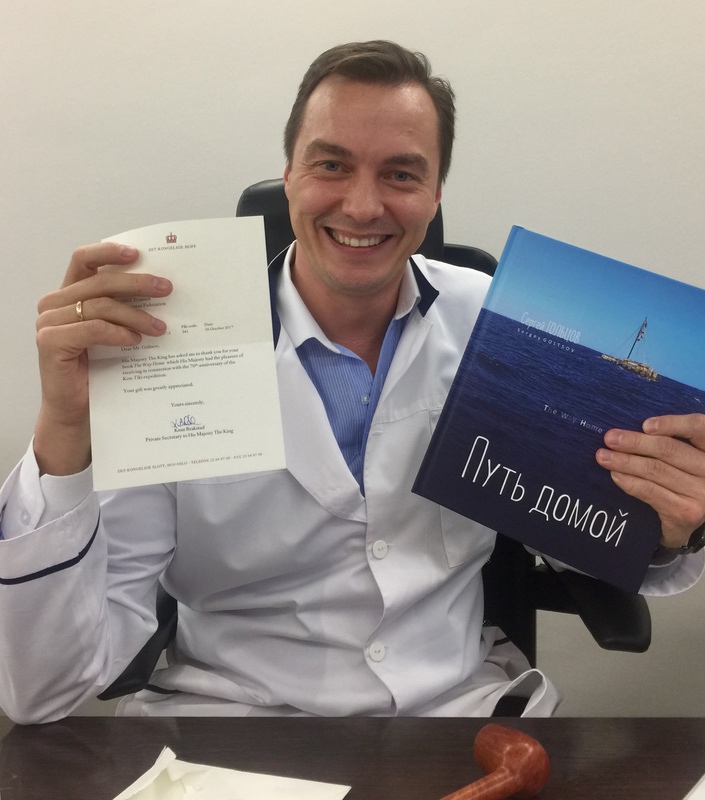
Friends, I have a great event! Every letter matters, but today is a special day – the first time in my life I received a letter from the ruling monarch. More...
About what you can and should be punished for
Here I, perhaps, will go for Otto von Bismarck, who said: "Whatever you say, it's still about money." I do not mean that medicine, whether it is public or private, works for money, but they are a sort of equalizer, an evaluation criterion. "By voting with the ruble," the patient does not just pay this money, but makes a meaningful choice - the value he gets, whether he is a cure or information about his condition, he pays. If he is ready to do this, then he likes the service, and he agrees with her inwardly. On the other hand, the performer of this service (doctor or nurse) depends on this assessment - this is his salary. The institution receives new opportunities, develops the technological base, expands the palette of drugs that are in the work of the department or a particular doctor. And if money does not exist, all these processes will be stalled. Someone should be responsible for the violation of the rules of the game, which may entail a patient's decision that is unfavorable to you: choosing another clinic, another doctor. After all, the patient, when he chooses not us but somebody else, why he did not decide why "not you": "I did not like", "I was deceived", "I sold more services than My problem demanded" and so Further. As a result, you do not receive money, someone else receives it. Begins to act in practice. "Be ill with us!". Why? Because the patient will still be sick or suffer from an unresolved aesthetic problem. But he will be ill either with your clinic, or with another, or with one doctor - you, or with another. Thus, this money equivalent of quality will go to one or another organization that ensures the development and improvement of the quality of the assistance provided. "The more clinics have paying customers, the more he will have the opportunity to help other patients - the" virtuous circle "is closed. The next stage can only be a transition to a new level: one office, then a department, and then a whole clinic that provides, perhaps, only one type of help (eg, ENT surgery), but does so so that recording to them a few Months ahead. And others, probably, amaze with a variety of variants, but in ENT surgery are not so perfect. The point is the appointment of doctors, whose education is invested in big money, in modern but proven equipment, in well-filled documentation, even in music that plays in the hall - and this is all costs. It is for this that the patient pays. Therefore, the doctor is not responsible for the result, and if due to his inexperience, unwillingness to develop or to match the result is not achieved, or his achievement is accompanied by gross violations, the employee is punished.
About the system of values
This can be called anything: "sanctions", de-repression, the coefficient of labor participation. The last option I like more, it is ethical. That is, you can participate more actively, and there will be more bonuses, you can participate less, and bonuses will be less. And from the deprivation comes the bonus unit. For example, we take a 100% payroll, and in one particular month we get 20% of objectively depressed people, and 20% of those who would like it - the system is hungry for balance. Here is an example of social competition - in the good sense of the word, with the goal of positioning yourself. When a wise doctor sees that an organization is able to teach him, he begins to fight for him, and then actively apply the knowledge gained. For example, in many clinics there are surgeons who are satisfied with their level of compliance with the requirements, and this does not mean that they are bad specialists, it just says that now they do not develop. They have acquired the necessary skills, they meet certain requirements, but they do not transfer themselves to unfamiliar, new conditions, do not expand the limits of their capabilities, and after five or six years of such a condition they can lose not so much work, how many patients, and then, as a consequence Already work. And there are other surgeons who attend conferences in Brazil, Israel and Singapore, sometimes even at their own expense, and they understand the importance of these costs. After all, the best investments are investing in self-education, because he always remains with you, and let him one day go to another level - teaching, mentoring. And here already the sense of accomplishment is different, and another category of values.
About who defines the guilty
Whom and for what to punish, determines the one who pays money, that is, the patient. But his decision may be imperfect, because he does not have sufficient medical competence, so it is expressed in a complaint. But the complaint of the patient should be perceived not as a reproach, an attempt to influence or an element of consumer terrorism, but as gratitude. After all, complaining, a person, as it were, tells you: "I do not believe it is true that I paid for this medical service because it did not do me any good" and explains the reasons. His position is the most sincere information that indicates what needs to be improved until these mistakes become systemic. A system error is a risk to the organization. The standard of medical care is a field that calls the patient and the doctor equal in the rights to provide services, and the head of the institution in this triumvirate provides these relationships, and all three must be in constant interaction. The standard defines the social, medical and economic outcome - whether the doctor has performed his work or not.
On the most terrible punishment
The most serious punishment for a doctor and staff is the censure of colleagues. Dismissal - this is legal formalities, the relationship between the doctor and the head on the principle of "employer-employee." This is not the worst thing for a doctor, because dismissal does not affect our internal guidelines related to conscience, ethics, continuity, and culture in general. And collegiality is scary. The doctor is brought up in the conditions of constant development of subordination in relation to his teachers, begins to nurture the mentor in himself from the student's bench. The greatest value for a doctor is to establish and maintain contact with colleagues. And when these relations not only do not line up, but also collapse, it is very painful, even the very prospect frightens. Therefore, now the medical commission is gaining more and more popularity as a certain subsidiary responsibility: there is not one doctor who insists on a certain standard or approach, and a few more people say that he is right in his opinion or is wrong, and then the right position is collegially developed. The world does not consist of individual people, phenomena and events, it consists of relationships that form a new reality. The more such connections, the more interesting it is.
About forgiveness
The moment of forgiveness is very convenient due to one phrase: "God will forgive", but much is hidden in it. God is not the image that we see in frescoes or icons, he is in each of us, in our conscience, in a sense of accomplishment, assumed obligations, responsibility for the consequences of his decision. Through these contexts, the physician analyzes his own, personal effectiveness and effectiveness, and with them he can objectively agree. For violation of these moral laws - ethics, subordination, - of course, you can not forgive. In some countries, for a public insult colleague, even justified, immediately select a diploma from the offender. Further the proceedings can continue, but the diploma is no longer there, and you are already a simple citizen, who can say for a long time that he is right. All on a formal basis, but for violating ethical standards of conduct. You can defend your position, prove the guilt or wrong of a colleague, but you have no right to insult him. I am for the same rules: what you can not forgive a doctor is a violation of cultural values on which medicine is based as a service and as a culture.

Friends, I have a great event! Every letter matters, but today is a special day – the first time in my life I received a letter from the ruling monarch. More...

An unexpected interview came from a conversation with the journalist of the newspaper Tyumen News Irina Tarabaeva.

Остаются считанные дни времени пребывания экспедиции Живая Параллель в Перу. Изучив тексты, увидев множество подтверждений мифов и обоснованности сведений об инках, встретившись с представителями разных социумов, возникших вследствии испанского завоевания, настало время разделить реальную жизнь с последними потомками инков. Благо, это оказалось реальностью, поскольку наш проводник Элвис, родом из народности кечуа, являющейся прямым наследником культурных традиций инков, видя нашу искреннюю (не туристическую) потребность пожить в культуре, любезно пригласил посетить его деревню.

В любой культуре есть ритуалы, некоторые из них ориентированы на улучшение здоровья, как физического, так и психического... читать о моём опыте